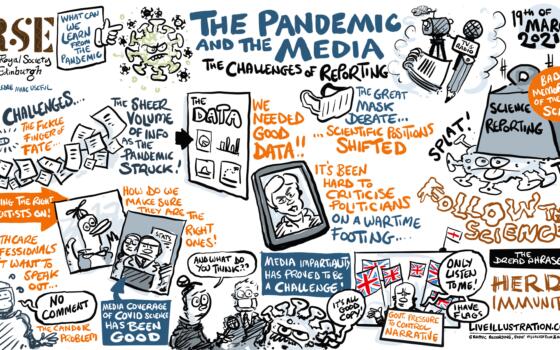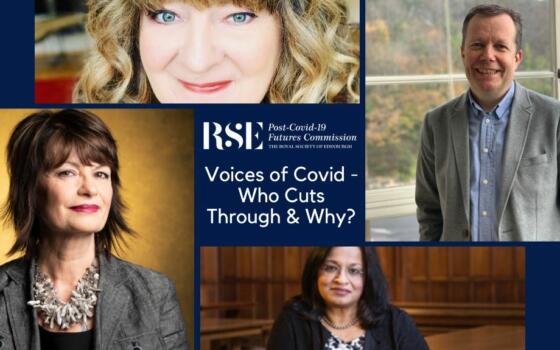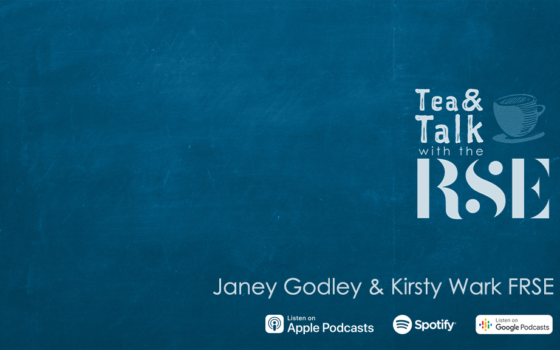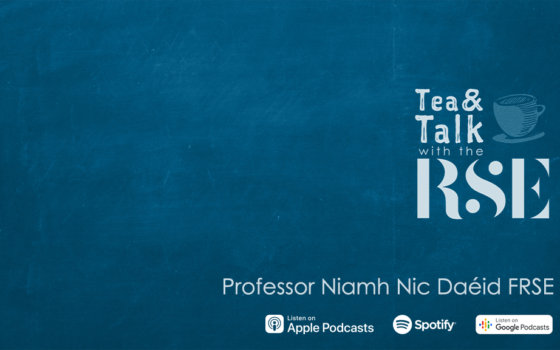Communication and public engagement around Covid-19 have been a focus of international interest.
In this overview I reflect on the key themes that have emerged from discussions which took place during two international Roundtables hosted by the Royal Society of Edinburgh (RSE), and a report written by the Democratic Society for the RSE’s Post-Covid-19 Futures Commission. Here I consider what this might mean for the future of democracy and public participation.
The two International Roundtables gave us a valuable insight into the actions and responses of a range of countries (see here for an overview of the Roundtables). The Democratic Society’s report provides eight case studies including representations from countries such as Belgium, Brazil and Finland. This important and accessible report draws attention to patterns of behaviour as well as good and bad practice in the wide-ranging responses, and enables us to draw comparisons and reflect on what we can learn moving forward. According to different country representatives at the RSE Roundtables, these varied approaches to tackling the pandemic have included a civic led approach (Taiwan), an authoritarian approach (South Africa), a paternal approach (Ghana), and a collaborative partnership with members of the public (New Zealand).
Regardless of the different government approaches to the pandemic, we have witnessed a shift in power away from citizens towards governments in most countries; with increased restrictions on people’s movement, increased police powers, contact tracing, limited access to basic rights (greenspaces, companionship), and curfews. In extreme situations information has been removed from the public domain (Brazil), and private multi-million-pound contracts have been made by Government ministers (UK). This has all meant that freedoms previously taken for granted by many have been curbed.
Arguably the existing social contract has shifted, perhaps irreversibly.
In a time of crisis this might be accepted or even necessary practice, yet what we have learned is that the public must also stay vigilant. If more trust and more powers have been passed to governments, will they be willing to give power back?
What we saw from some countries was less of a power grab and more of a power share e.g. New Zealand and Taiwan. ‘Adult conversations’, co-producing solutions and policy, and transparency are key principles that were upheld in countries that are deemed to have done well – in that they have low community transmission and low death rates. The Scottish Government has also taken steps to hear from citizens; using surveys, open forums and citizens’ juries to ask the public about their experiences. However, we have not witnessed any real efforts to facilitate public participation in decision-making across the UK.
The report and Roundtables confirmed that this was a pattern in many countries, yet many of the representatives interpreted public participation simply as the public complying with the restrictions (Democratic Society report 2021, 42).
Interpreting participation as compliance is problematic.
Compliance suggests that the public is obedient or content to abide by restrictions but with many restrictions being confusing or contradictory this has created a grey area where the public is not fully clear on whether restrictions are law or guidance. A vibrant democracy is not based on the aptitude of its people to comply or obey but to question, critically engage and hold government to account. This is crucial in relation to a government’s presentation of ‘scientific’ information.
In order to develop citizens’ capacity to do this, there needs to be a concerted effort to upskill the population in terms of engaging critically with scientific evidence, digital efficacy and media literacy as information is not as accessible as it could be. Finland’s efforts (Democratic Society report 2021, 26) to tackle fake news and misinformation and Canada’s Let’s Talk Science (Democratic Society report 2021, 14) are particularly notable in that they are working towards creating a critical body of citizenry, capable of recognising credible sources and unpacking government information. This is a key part of maintaining any sort of legitimacy in governance.
It is also important to widen our definition of public participation to include bottom-up approaches.
Participation doesn’t necessarily mean sitting in a room taking part in a Citizens’ Assembly, nor does it always include top-down government initiatives. In Scotland, participation did take place during the Covid pandemic: mutual aid groups, community engagement, and third sector organisations reaching out to digitally upskill their members such as Glasgow Disability Alliance (GDA), Inclusion and The Poverty Alliance. Similarly, in New Zealand there were examples of significant collaboration between local networks and larger partners to deliver support to communities, such as getting laptops out to families before the lockdown (see report, page 32). There has also been a significant increase in online conversations and sharing of information on social media.
A recent international study shows that the response and compliance from the public appears to have been linked to trust of government and scientists, the spread and impact of misinformation but also based on the perceived risk of Covid-19 (Lindholt et al. 2021). And as the World Health Organisation (WHO 2021) tells us, community engagement is required in order for governments to better understand how communities perceive government responses to the pandemic but also to hear questions, fears and doubts. Underrepresented communities have been overlooked – travellers, asylum seekers, disabled people and indigenous people. NGOs and third sector organisations offered vital lifelines to these groups in lieu of government support. This shows a palatable negligence from governments and was a missed opportunity to work with these communities.
Finally, it is worth reflecting that the processes of the Roundtable and producing DemSoc’s report facilitated vital ways for those at the frontline of communicating and creating public policy to share, unburden and compare stories, which was a relief for some and contributed to a valuable evidence base for all.
These were opportunities for critical and considered reflection on what worked and what did not in light of the pandemic.
These activities have provided crucial sources for learning and sharing, activities which should continue to be supported in order to provide much needed insight for the next pandemic. Scotland’s newly announced Future Pandemic Expert Group may wish to reach out to similar groups internationally to continue this form of communication. Furthermore, effort needs to be made to support citizen inclusion into this sort of setting to involve them in problem-solving and learning for the future.
Authored for the Post-Covid-19 Futures Commission by Dr Ruth Lightbody (Glasgow Caledonian University), member of the Public Debate & Participation working group. Read the Rapid Review (Democratic Society) and Rapporteur Report (by Dr Ruth Lightbody) now, both available online here, alongside a video also produced by Democratic Society to highlight the review’s key themes.
References/further reading
-
Kambli, N. Waud, A. Basford, M. McBride, K. Zur-Clark, A. (2021) ‘Rapid review of international evidence on Covid-19 communication and public engagement’. Democratic Society. Available: https://www.rsecovidcommission.org.uk/wp-content/uploads/2021/08/InternationlReview-DemSocReport-Final.pdf
-
Lindholt MF, Jørgensen F, Bor A, et al. (2021) ‘Public acceptance of COVID-19 vaccines: cross-national evidence on levels and individual-level predictors using observational data’. BMJ Open 11: e048172. doi: 10.1136/bmjopen-2020-048172
-
World Health Organization (WHO) (2021) Conducting community engagement for COVID-19 vaccines. Available: https://www.who.int/publications/i/item/WHO-2019-nCoV-vaccination-community-engagement-2021.1







